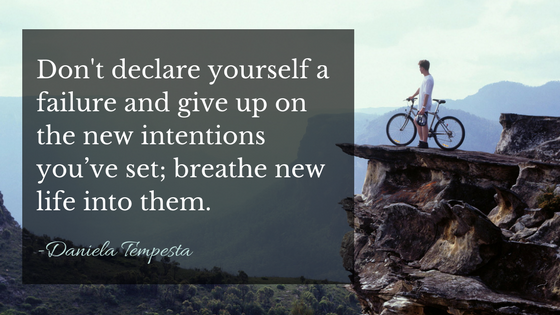We are a couple of weeks into January, and you’ve had some time to start working on your resolutions.
How’s it going?

Has the resolution that seemed so doable a few weeks ago — work out every day, give up chocolate, read more — started to feel more and more challenging to maintain?
Before you declare yourself a failure and give up on those new intentions you’ve set, let’s try to breathe some new life into them.
The following three scientifically based tips will help nudge you back on course and approach resolutions in a way that will actually make them stick!
1. Add a Question Mark
Instead of thinking of your resolution as a declaration of what you will do, try phrasing it as a question.
Rather than saying, “I am going to get in better shape,” ask “How will I get in better shape?” Instead of saying, “I am going to meditate daily,” ask “When will I schedule time to meditate?”
Research shows that when it comes to motivation, questions seem to work better than statements. Posing a goal as a question stimulates the mind to find intrinsically motivated reasons to pursue the goal, and intrinsic motivation is shown to increase goal completion.
In other words, posing the question helps us connect to the underlying motivation for achieving the goal, keeping us on track.
Additionally, when we pose resolutions as questions, we are forced to think about how to logistically accomplish them. Using the example above, if we ask, “When will I schedule time to meditate?” we start to think about the actions necessary to accomplish the goal. Some of those actions might be to set an alarm or reminder to meditate at 8 p.m., create a meditation space in your home, or ask a friend to commit to meditating so you have someone to be accountable to.
This process makes it much more likely that you will stick to the resolution because you have thought about what should happen to realistically sustain it.
2. Share Your Goals with a Friend
Psychology professor Dr. Gail Matthews of the Dominican University of California conducted a study that found that more than 70% of the participants who sent weekly updates on their goals to a friend either completely accomplished their goal or were more than halfway there, compared to 35% of those who kept their goals to themselves, without writing them down.
Writing down your goals provides clarity, and sharing your progress regularly with a friend provides accountability for making incremental progress on your goal until it is achieved.
3. Replace Self-Criticism with Self-Compassion
People often mistakenly believe that criticism actually improves motivation and helps us stick to our resolutions, but the opposite is actually true. While it may seem counter-intuitive, being kind to ourselves when we slip up on our goals is actually the key to getting back on track and achieving success.
Research has found that self-criticism decreases goal completion because it increases procrastination and over-analysis. Conversely, research by Breines and Chen found that people who were compassionate towards themselves after making a mistake or identifying a personal weakness had increased motivation in regard to self-improvement.
So next time you skip the gym or have that piece of chocolate, instead of berating yourself, offer yourself some kind words such as, “It’s okay, we all mess up sometimes. These new resolutions are tough, but I know they are important to my well-being.”
If you find being compassionate to yourself to be difficult, pretend you are talking to a friend who just lapsed on a goal and give that same encouragement to yourself.
If the research cited above is not motivation enough to be kinder to yourself, consider that self-compassion is also associated with higher levels of happiness and optimism, as well as decreased levels of depression and anxiety.
So not only will being kind to yourself help you with your resolutions, it will also improve your overall well-being.
Armed with these three tips, you are sure to conquer all of your resolutions by year’s end.



